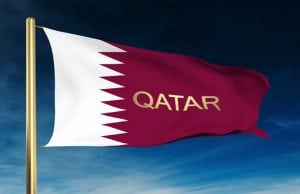By Niraj Srivastava – www.thecitizen.in
NEW DELHI: In an analysis of the ongoing dispute between Saudi Arabia and Qatar  published on June 12, this writer had commented that the “Saudis might have bitten off more than they can chew.” That is what appears to be happening, according to the latest developments in the region.
published on June 12, this writer had commented that the “Saudis might have bitten off more than they can chew.” That is what appears to be happening, according to the latest developments in the region.
When the Saudis and their allies—the UAE, Egypt, and Bahrain—announced breaking of diplomatic relations and imposition of a blockade against Qatar on June 5 for “sponsoring terrorism,” they expected Qatar to capitulate to their demands quickly, within days. However, that has not happened so far, more than a month later.
If anything, Qatar has hardened its stand and categorically rejected the threats and ultimatums issued by the Saudis and their friends, refusing to succumb to their pressure. The Qatari Foreign Minister has said that Qatar will “never surrender our sovereignty to end the siege” and saw “little chance of a rapid reconciliation.” Qatar has also reminded the UAE that 80% of its electricity supplies depend on the export of Qatari gas to the Emirates.
Earlier, on June 23, the Saudis and their allies had presented a list of 13 “demands” to Qatar with an ultimatum to accept them within ten days. According to some analysts, the demands were so unreasonable that they were “designed to be refused.” Their acceptance by Qatar would have meant complete loss of its sovereignty and subjugation to Saudi Arabia.
The demands included, inter-alia, severance of diplomatic relations with Iran; end of Qatari support to the Muslim Brotherhood, Hamas, and some other Islamist groups; closure of the Qatari TV channel Al Jazeera; and alignment of Qatar’s policies with those of the other Gulf and Arab countries.
Saudi Arabia, the UAE, and Bahrain have a particular dislike for the Muslim Brotherhood (MB) because it does not accept the primacy of absolute Arab monarchies. MB offers an alternative model of Islamic government by adopting some democratic participation of the people in the political process. Qatar’s funding and support to the MB is seen by some Gulf regimes as an existential threat.
Secondly, the Saudi action against Qatar for “sponsoring terrorism” rings hollow, because Saudi Arabia is widely viewed as the biggest financier and supporter of terrorist groups in the world. The Kingdom’s client, Pakistan, is seen as the “ground zero” of terrorism globally, for harbouring a very large number of terrorist groups on its soil.
In addition to the demands mentioned above, Qatar was asked to terminate the Turkish military presence in the country immediately, and sign a blank cheque covering “reparations and compensation for loss of life and other financial losses caused by Qatar’s policies in recent years.” The ultimatum did not specify what would be done if Qatar did not comply with the demands.
In the event, Qatar did exactly that: it ignored the ultimatum, despite its extension—at the behest of Kuwait—for two days, till July 5. On that day the foreign ministers of Saudi Arabia, the UAE, Bahrain, and Egypt met in Cairo, and said they “regretted” Qatar’s “negative” response to their demands, and will enact new measures against it.
They released a Joint Statement on July 6, saying that their initial list of 13 demands was now void, and pledged new political, economic, and legal steps against Qatar.
Qatar’s non-compliance with the ultimatum is being viewed as a major embarrassment for Saudi Arabia & Company, which grossly miscalculated and did not have a Plan B in case Qatar refused to be intimidated by them.
On the other hand, Qatar, helped by its immense wealth, is preparing for the long haul by establishing new supply networks for essential commodities such as food and water. Iran and Turkey are major beneficiaries of this operation.
Though Qatar’s growing closeness to Iran and its support for the Muslim Brotherhood are two major reasons for the Saudi action against it, there are other important economic reasons also. On April 14, 2015, Qatar launched the first Chinese Yuan clearing hub in the Middle East, saying it would boost trade and investment between China and the Gulf states. Four major Chinese banks have also identified the Gulf and the West Asia and North Africa (WANA) region as a priority area for their operations.
This cannot have been good news for the Saudis and the Americans, who want oil and gas to be priced only in US Dollars. Their pricing in Yuan would be a threat to the petrodollar hegemony.
Qatar’s wealth is based on a gas field it shares with Iran, the largest in the world. It needs good relations with Iran to exploit the gas reserves in the field, known as North Dome in Qatar and South Pars in Iran. It is, therefore, unlikely that Qatar will end its cordial relationship with Iran merely to please the Saudis. Qatar’s future economic prospects depend on cooperation with Iran, which has emerged as the biggest winner in the Saudi-Qatari spat.
If the Saudi blockade of Qatar continues, Iran’s farmers would be in a position to sell around 400,000 tonnes of food annually to Qatar, with corresponding losses for the Saudi food industry, which used to meet Qatar’s requirements. Qatari air traffic in Iranian airspace has already increased by around 17% since the closure of Saudi airspace to Qatari aircraft.
The other big gainer in the above imbroglio has been Turkey, which has already sent around 4000 tonnes of food to Doha. Some 105 Turkish cargo planes loaded with food and other aid have landed in the country.
Turkey is also bolstering its military presence in Qatar. 88 Turkish troops along with five armoured vehicles recently landed in Doha. The number of Turkish troops could go up to 1000, or even 3000, according to an agreement signed by the two countries a few years ago. A Turkish air force contingent in Qatar is also on the cards.
Qatar has taken other steps which suggest that it is preparing to face the Saudi blockade for an extended period. According to a Reuters report, Qatar plans to boost its LNG production by around 30% in the next 5 to 7 years, amounting to around 100 million tonnes per year. That would be equal to about one-third of global production of LNG, and would likely take some market share away from Saudi Arabia and other countries. Also, it could trigger a price war, which would hurt the Saudis.
No wonder some analysts believe that Qatar has enough financial resources to face the Saudi blockade for years.
Observers also believe that the Saudis and their allies are unlikely to embark on a military invasion of Qatar. The most important reason for this assessment is that Qatar hosts the largest US military base in the Middle East—the Al Udeid air base—which is CENTCOM’s forward headquarters in the region and where around 10,000 US soldiers are deployed. The US Secretaries of State and Defence have called for a negotiated peaceful solution to the dispute. The deployment of Turkish military in Qatar has further muddied the waters.
Also, in recent statements, the UAE and Saudi foreign ministers have not threatened to invade Qatar. The UAE minister has said that the alternative [to Qatar’s non-compliance with the ultimatum] is not escalation but “parting of ways.” The Saudi foreign minister has stated that boycott of Qatar will continue until it changes its policies in line with those of Riyadh.
As things stand, it appears that the Saudi misadventure in Qatar—engineered by the Saudi Crown Prince Mohammad bin Sultan (MbS), with encouragement by his “mentor,” the UAE Crown Prince Mohammad bin Zayed—has backfired. This is the second major Saudi fiasco attributed to MbS—the first being his invasion of Yemen two years ago, which has drained Saudi resources without achieving any objectives, other than causing large-scale death and destruction in that already impoverished country.
If MbS is rash enough to invade Qatar, he is highly unlikely to subdue that country. Qatar is not Yemen; it has immense financial resources and friends in high places, including the US, EU, and China. Invading Qatar will drive the country further into the arms of Iran, the target of the Trump-Saudi “Sunni NATO.”
MbS is also unlikely to get much support or mercenaries for invasion of Qatar even from Saudi clients such as Pakistan, which reportedly refused to openly back the Saudis against Qatar when asked by King Salman whether Pakistan was “with us or with Qatar.” In the GCC, both Kuwait and Oman have important commercial relations with Iran and have maintained their neutrality in the dispute. They do not approve of the Saudi action against Qatar.
According to one report, neither King Salman nor MbS will travel to Hamburg to participate in the forthcoming G-20 meeting in Germany, because they fear a coup if either of them leaves the country. This report may or may not be correct, but it suggests that all is not well with the Saudi Royal Family, because of the manner in which MbS was made the Crown Prince, and his follies in Yemen, and now Qatar.
The Saudi-Qatar dispute is unlikely to end anytime soon unless there is a regime change in either of them. By threatening new political and economic sanctions, the Saudis have left no room for a face-saving formula that could be acceptable to both sides. Moreover, Qatar has gained new allies such as Iran and Turkey, whose power and influence is not inconsiderable.
As a result, the geopolitics of the Persian Gulf has changed, probably irrevocably. For all practical purposes, Qatar is out of the GCC in the foreseeable future. The “Sunni NATO,” headed by a Pakistani General, is stillborn. The dynamics of the war in Syria may change, with Qatar-backed Jihadi groups becoming quieter—a gain for President Assad and a loss for the Saudis, the US, and its allies.
MbS has, single-handedly, achieved a great deal, though not in the interest of Saudi Arabia. He is likely to be preoccupied with saving his own skin—and that of his father—in the foreseeable future.
(Niraj Srivastava is a former Ambassador of India who has served in Saudi Arabia, Syria, Libya, and the United States, among other countries )



